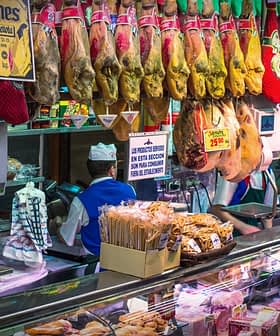Nutri-Score Label Not Required for Spanish Olive Oil, Minister Says
Producers and distributors in Spain will not be required to use the controversial Nutri-Score labeling system on olive oils, as announced by Minister of Consumption Alberto Garzón. The decision not to apply the “yellow C” label to olive oil comes after lobbying by the Interprofessional Organization of Spanish Olive Oil, which argued that the system does not consider the health benefits of olive oil and could mislead consumers. Despite opposition from some scientists and nutritionists, the European Food Safety Authority will provide scientific advice on nutrient profiling and labeling systems, with findings expected by March 2022.
Producers and distributors in Spain will not need to apply the “yellow C” assigned by the controversial labeling system Nutri-Score to their olive oils, Minister of Consumption Alberto Garzón announced.
Olive oil is good for your health, and cannot have a label that says it’s bad.
“We have reached an agreement with the distributors so that Nutri-Score is not required for olive oil,” Garzón told Andalusia’s Canalsur. “In the meantime, we are trying to change its valuation.”
“Olive oil is good for your health, and cannot have a label that says it’s bad,” he added.
The announcement comes after a concerted lobbying campaign by the Interprofessional Organization of Spanish Olive Oil, a non-profit that represents the sector, for the ministry to reconsider its plans to introduce the front-of-pack labeling (FOPL) system.
See Also:Spanish Producers Join Chorus of Concerns Over Nutri-ScoreThe Interprofessional said the French-born FOPL does not take the health benefits of olive oils into due account and ultimately penalizes the product.
“The consumer would see that extra virgin olive oil is labeled with a C and the color yellow,” the Interprofessional said. “And that sends a message of alert regarding the consumption of the product. We fear that many consumers will take it as a warning to limit their consumption.”
However, Pedro Barato, the organization’s president, has emphasized that the Interprofessional supports initiatives to inform and educate consumers.
“We are aware that any recommendation based on scientific evidence will give olive oils a premium role as the main contributors of fat in a balanced diet,” Barato said.
The decision not to label olive oil with the “yellow C” comes in spite of a recent spate of lobbying on behalf of the FOPL by dozens of Spanish scientists and nutritionists.
According to Food Navigator, the campaign promoters emphasized that the French FOPL mechanism is “based on science.” They confirmed that peer-reviewed studies have shown how consumers understand the label and that its presence on food packages allows them to make healthier choices.
Nutri-Score’s promoters also noted the “imperfections and limitations” of the labeling system are typical of “any nutritional logo and any public health tool.”
The scientists’ position was also supported in the last few days by an established consumer association in Spain. The Organization of Consumers and Users (OCU) has formally asked the European Union to adopt a food labeling system and emphasized how Nutri-Score should be selected among the various methods.
“Nutri-Score is currently the most efficient system in allowing consumers to compare the nutritional quality of foods in a range of products and help them make healthier purchasing decisions,” the OCU wrote.
The organization added that to be effective, Nutri-Score should become mandatory throughout the E.U.
Meanwhile, Italian farmers and agricultural associations have once again stated their opposition to the idea of the E.U.-wide adoption of Nutri-Score in a recent parliamentary hearing about the bloc’s Farm to Fork Strategy.
Nutri-Score is currently the most efficient system in allowing consumers to compare the nutritional quality of foods in a range of products and help them make healthier purchasing decisions.
They asserted once again that Nutri-Score often classifies “junk food” with better scores than traditional and protected local foods.
Massimo Giansanti, president of the Italian farmers federation, Confagricoltura, and vice-president of the European Copa, has asked for unity in defining the new food policies, including the labeling systems, “paying a lot of attention to the models we want to adopt to safeguard consumers health.”
“The labeling system must aim to offer accurate information,” Giansanti added. “But if we get to the point of saying that processed food is better than natural food, then we should all think twice about it.”
See Also:Nutri-Score Remains the Front Runner for Europe’s Food Label ProgramAlong with Giansanti, Herbert Dorfmann, a member of the European Parliament’s agriculture committee, and Paolo De Castro, a member of the international trade committee, have expressed their opposition to a mandatory labeling system.
“Systems like the French Nutri-Score do not offer accurate information to consumers but influence their food choices, misleading them with overly-simplified directions,” the two said.
“It is not acceptable that European agricultural products be demonized, without considering that the Mediterranean diet, renowned as healthy all over the world, is based on a balanced consumption of food with different nutritional profiles,” they added.
To help clarify the competing claims about the effectiveness of Nutri-Score or any other FOPL system, the European Food Safety Authority (EFSA) announced that it would provide relevant scientific advice.
The group will advise the European Commission on nutrients that are of public health importance to European populations, the food groups that hold important roles in the diets of the continent’s various cultures and criteria to guide apt nutrient profiling.
On its website, EFSA explained that it would also offer its view “on selecting the criteria to guide the choice of nutrients and other non-nutrient components of food for nutrient profiling.”
“To do so, our experts will assess recent scientific information, including published reviews on dietary recommendations for healthy diets based on evidence from studies on humans and EFSA’s work on dietary reference values and nutrient profiles,” EFSA added.
The group has been tasked with delivering their findings by March 2022 but said they would have a first draft available for public consultation by the end of the year.
Daniel Dawson contributed to this report.









